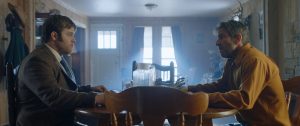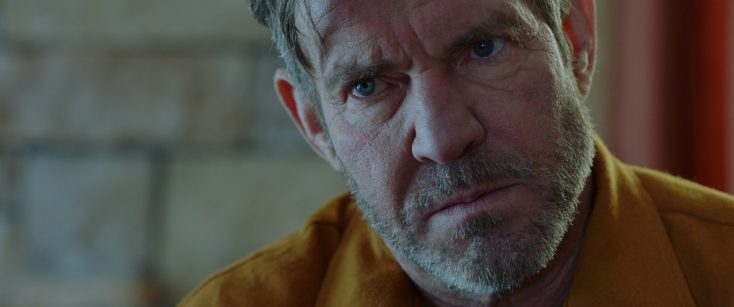
Bart Millard (John Michael Finley) and Arthur Millard (Dennis Quaid) have a confrontation in the new film I CAN ONLY IMAGINE. ©Lionsgate and Roadside Attractions.
By ANGELA DAWSON
Front Row Features
HOLLYWOOD—Dennis Quaid has played a range of characters in his long illustrious career, some fictitious (“Cap” Rooney in Oliver Stone’s “Any Given Sunday”), some larger than life (Doc Holliday in “Wyatt Earp” and Jerry Lee Lewis in “Great Balls of Fire”). Lately, the Houston native has gravitated toward family and faith-based films including 2011’s “Soul Surfer,” and last year’s “A Dog’s Purpose.” In “I Can Only Imagine,” he plays an alcoholic who drives his son away after years of physical and emotional abuse but then tries to make amends when he learns he has a terminal disease and undergoes a spiritual transformation.
The film about second chances is based on the real-life relationship of Christian rock musician Bart Millard and his father, Arthur Millard. After reconciling with his estranged father shortly before his death, Bart was inspired to write the song “I Can Only Imagine,” which became a crossover hit in 2001 on the pop, country and adult contemporary charts. It is the only contemporary Christian song certified double platinum. It also earned Dove awards for Song of the Year and Songwriter of the Year. Millard, who like Quaid is a native Texan, wrote the lyrics and composed the music with his MercyMe band mates in just a few minutes, but it was based on a lifetime of experience. Amy Grant, among other notable musicians, have covered the inspiring song.
In an interview, Quaid reveals he didn’t know the song, or the incredible story behind it, when he received a copy of the screenplay to read. He simply was moved by the story. As a musician himself, he knows the power music can have on a person’s soul. He stars in the film alongside J. Michael Finley, a Broadway actor making his screen debut at Bart, Madeline Carroll, who plays Bart’s understanding girlfriend Shannon, country singer/actor Trace Adkins, as Bart’s manager Brickell and Cloris Leachman as Bart’s grandmother. The drama is co-directed and co-written by brothers Jon and Andrew Erwin.
Q: What’s the magic that drew you into this project?
Quaid: Well I did “Soul Surfer,” which was another faith-based film, if you want to call it that. The real Bethany Hamilton was on the set and her brother was working on the crew, and we became friends. Afterwards, he sent me this (script) and the CD. (Filmmakers) Andy and Jon contacted him as a way in. I put the CD aside, and checked out the script to see if I wanted to do it. I was so profoundly moved by this story, and how raw it was. It’s kind of scary-truthful in a way. It’s very brave on Bart’s part to even tell this story.
Q: Were you aware of the song at the time?
Quaid: No I was not. I wasn’t aware of it, or Bart (Millard, the writer-singer), his story or anything.
Q: The fact that you play music and have been in other movies with music, does that aspect appeal to you in how deep it gets you?
Quaid: Yeah, for sure. A song comes on the radio from sometime back in your life and it brings up exactly where you were, what you were doing and what you were thinking. It brings up feelings why you were so attached to it.
Q: How did you prepare for the role of Arthur Millard? Is there anything you can identify with him?
Quaid: I’m certainly not the kind of dad Arthur was. (My preparation) was talking to Bart, when I got to the set. I sat Bart down and had him tell me—out of his own mouth—the story. It was a great gateway of getting to his father, just watching Bart, not even the words or the story about it. Just feeling Bart as he told his story. And then, in just the doing of it. J. Michael (Finley, who plays Bart) was such a great actor. Very vulnerable to work with; a very great talent. New to the scene. And great singer in his own right. Andy and Jon were molding the story. We were all in there making something out of nothing. Every day, really, because it doesn’t matter what’s on the page.
You get in there and you have to play these really difficult (scenes). You don’t want to go there (emotionally), really. Who wants to go there? But we did. We got it. But there always, for me, has to be a tiny bit of distance because there’s distance when somebody is abusing somebody like that. They’re separated from what is really going on. They’re unaware to begin with. So, in between takes, I would drop it like a hot potato, and go out to my trailer, watch whatever was on the satellite TV. What we were going for was the truth. Bart was there on the set. We wanted to make it real for him more than anything.
Q: It’s kind of unusual to have the real person you’re playing looking over your shoulder, isn’t it?
Quaid: I’ve kind of gotten over that. I had Jerry Lee Lewis right over my shoulder when I was doing “Great Balls of Fire,” going “You’re getting it wrong, son,” for like three months, and then (baseball player) Jim Morris was on the set of “The Rookie.” He was a little more pleasant. But there comes a time, when I’m doing a film, where I knew more about the character—of Arthur, in this case—than Bart did, in a sense. It’s just a way I felt inside playing the character of Arthur. Everything doesn’t have to be exact exact. The way I feel about playing real people is I try to capture the essence of them.
Q: You had two things to deal with. One was being a father who was abusive, and also a father who was aware he was abusive, and he’s dying. How did you pile both things into one character?
Quaid: It’s an amazing arc of a human being, let alone a character. Most abusive parents were abused kids by relatives or by someone else but there’s just no excuse for abuse. He was bitter about his own supposed dashed hopes and dreams. How real they may have been or not, I don’t know. But he made Bart feel bad about himself and he physically and verbally abused him. He emotionally abused him every single day of his life. When you do that to a kid, it affects the way they think about themselves, who they are and their worth as a person. That went on well into Bart being a young man, to the point where he just had to leave home. His mom wasn’t there either, and so he just had to get out. Unbeknownst to Bart, Arthur got a diagnose with this death sentence kind of cancer. It forced him to really look at himself and his life, and he wanted to have a relationship with Bart, and Bart wouldn’t have it at all. He wouldn’t buy it.
Prayer forces us to really look at our true selves because that’s who you’re talking to—your true self—through God. He found he had a spiritual awakening through Christianity and through Jesus and he wanted to make amends, ask for forgiveness, which wasn’t expected to happen. But, slowly, it worked for him, and worked for Bart. He came around and forgave him, and Arthur had to forgive himself, which is really hard. They had the most loving, close relationship at the end of Arthur’s life. And there was that gift that Arthur gave Bart at the end where Bart did not have to spend the rest of his life feeling the way he did about himself. And then this song comes along, “I Can Only Imagine,” that he wrote about his dad. It was a huge-selling song. The reason it was is because everyone who hears the song and listens to the words take it personally into their own lives for one reason or another. It hits in a place where we don’t have words. There’s a yearning there.
Q: Do the roles you play ever have an influence on your real life?
Quaid: I learn something from every part I do. I take away something. I don’t know if I can put it into words sometimes. Movies are made to make us feel things. They hit us in place that we don’t have words for. In a way, they kind of point the way at that. So, yeah, I guess it changed me but I’m not quite sure how. I’m glad to be here today talking to you about it. (He laughs.)
Q: What do you have next? What are you working on or what’s coming up?
Quaid: Actually, I got my Nordic sailor’s haircut and I’m going to be shooting at the North Pole in about another week, 200 miles from the North Pole. It’s a series for Amazon called “Fortitude.” It’s a really great series. It’s in its third (and final) season. My second. We’re shooting near the North Pole where it has 1,000 people and 3,000 polar bears.





